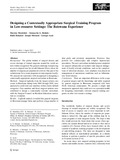Please use this identifier to cite or link to this item:
http://hdl.handle.net/10311/1427Full metadata record
| DC Field | Value | Language |
|---|---|---|
| dc.contributor.author | Mutabdzic, Dorotea | - |
| dc.contributor.author | Alemayehu, Bedada G. | - |
| dc.contributor.author | Bakanisi, Balisi | - |
| dc.contributor.author | Motsumi, Joseph | - |
| dc.contributor.author | Georges, Azzie | - |
| dc.date.accessioned | 2016-01-25T11:43:27Z | - |
| dc.date.available | 2016-01-25T11:43:27Z | - |
| dc.date.issued | 2012-08-01 | - |
| dc.identifier.citation | Mutabdzic, D. et al. (2013) Designing a contextually appropriate surgical training program in low-resource settings: the Botswana experience, World Journal of Surgery, Vol. 37, No. 7, pp.1486–1491. | en_US |
| dc.identifier.issn | 0364-2313 (print) | - |
| dc.identifier.issn | 1432-2323 (online) | - |
| dc.identifier.uri | http://hdl.handle.net/10311/1427 | - |
| dc.description.abstract | Background The global burden of surgical disease and severe shortage of trained surgeons around the world are now widely recognized. The greatest challenge in improving access to surgical care lies in sub-Saharan Africa, where the number of surgeons per population is lowest. One part of the solution may be to create programs to train surgeons locally. We present our experience with an approach to designing a contextually appropriate surgical curriculum in Botswana. Methods Surgical logbooks from the largest tertiary care center in Botswana, dating from 2004 through 2010, were analyzed to yield total case numbers within clearly defined categories. Case numbers and local surgical opinion were combined to design a contextually relevant curriculum, with the Surgical Council on Resident Education curriculum as a template. Results Logbook analysis revealed that general surgeons in Botswana manage burns and perform a large number of skin grafts and extremity amputations. However, they perform few colonoscopies and complex laparoscopic procedures. The new curriculum included greater emphasis on surgical subspecialty procedures and surgical management of locally relevant conditions, such as the complications of infectious diseases. Less emphasis was placed on management of uncommon conditions such as inflammatory bowel disease. Conclusions There are important differences in the scope of general surgery and the knowledge and skills required by general surgeons in Botswana compared with their North American counterparts. We present a simple and inexpensive approach that could serve as a potential model for designing contextually relevant surgical training programs in other low-resource settings. | en_US |
| dc.language.iso | en | en_US |
| dc.publisher | Socie´te´ Internationale de Chirurgie, http://www.iss-sic.com/index.php?id=3 | en_US |
| dc.subject | Surgical training program | en_US |
| dc.subject | Middle income country | en_US |
| dc.subject | Surgical residency program | en_US |
| dc.subject | Surgical care | en_US |
| dc.subject | Low resourced setting | en_US |
| dc.subject | Training curriculum | en_US |
| dc.subject | Competency based education | en_US |
| dc.subject | Botswana | en_US |
| dc.title | Designing a contextually appropriate surgical training program in low-resource settings: the Botswana experience | en_US |
| dc.type | Published Article | en_US |
| dc.rights.holder | Socie´te´ Internationale de Chirurgie | en_US |
| dc.link | DOI 10.1007/s00268-012-1731-9 | en_US |
| Appears in Collections: | Research articles (Dept of Surgery) | |
Files in This Item:
| File | Description | Size | Format | |
|---|---|---|---|---|
| art%3A10.1007%2Fs00268-012-1731-9.pdf | 181.54 kB | Adobe PDF |  View/Open |
Items in DSpace are protected by copyright, with all rights reserved, unless otherwise indicated.
